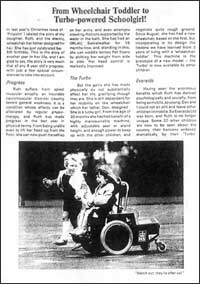

|
|
YOU ARE AT:
home >
mobility >
early mobility
an article written by Lou Everard in 1984 | ||||||||||||
From Wheelchair Toddler to Turbo-powered Schoolgirl!In last year's Christmas issue of 'Pinpoint' I related the story of my daughter, Ruth, and the electric wheelchair her father designed for her. She has just celebrated her 5th birthday. This is the story of another year in her life, and I am glad to say, the story is very much that of any 4 year old's progress with just a few special circumstances to take into account. 
ProgressRuth suffers from spinal muscular atrophy, an incurable neuromuscular disorder causing severe general weakness. It is a condition whose effects can be alleviated by regular physiotherapy, and Ruth has made progress in the last year in physical terms. From being unable even to lift her head up from the floor, she can now push herself up on her arms, and even attempts crawling motions supported by the water in the bath. She has had an ORLAU Swivelwalker for 18 months now, and standing in this, she can waddle across flat floors by shifting her weight from side to side. Her head control is markedly improved. The TurboBut the gains she has made physically do not substantially effect her life, gratifying though they are. She is still dependent for mobility on the wheelchair which her father, Dan, designed. She is a lucky girl. From the age of 20 months she has had benefit of a highly manoeuvrable machine, with adjustable seat or stand height, and enough power to keep up with the other children, and negotiate quite rough ground. Since August, she has had a new wheelchair, based on the first, but incorporating in its design the lessons we have learned from 3 years of living with a 'wheelchair toddler'. This machine is the prototype of a new model - the 'Turbo' is now available to other children. EveraidsHaving seen the enormous benefits which Ruth has derived psychologically and socially, from being so mobile, so young, Dan and I could not sit still and leave other children immobile. So Everaids Ltd was born, and Ruth is no longer unique. Some 20 other children are now to be seen about the country, their horizons widened dramatically by their 'Turbo' wheelchairs. As it's a family business, Ruth is as concerned as any of us about each individual child, and counts them as new friends as they come to collect their chairs. I think it has been a relief to her to stop being unique. It is much nicer to be the founder-member of the Turbo-owners club! IntegrationShe takes her Turbo to school every day, and the teachers stress its importance in allowing her to integrate fully into a mainstream school. In her swivelwalker she is too slow to keep up, and being pushed around would deny her the independence she is used to. Many of her classmates have known her and her wheelchair since their playgroup days, and so there is no problem of acceptance; she's just Ruth! In the playground, her Turbo is a source of fun, particularly with the older children, who play chase with her, and respect her for the exciting vehicle which she, and only she can drive. There are still difficulties to be overcome in helping Ruth integrate fully, however. It is not always going to be a case of goodwill and acceptance making it possible. We are lucky that the local primary school is well-laid out for wheelchair access, but the access to secondary schools in the area will need to be improved, if she is to maintain equality of opportunity she now has, in five years time. The 1981 Education Act has, of course, given parents a lot of say in special provision (once they have managed to understand its provisions and implications). Yet implementation of the new law is held back by lack of resources. Integration is also dependent on the willingness and ability of the staff to cope with special needs, and the kind of support and training that is available to them. Parents can play an important role in this, as we are the experts on our child's needs, and, with enough discussion and contact, practical difficulties, which otherwise might grow out of proportion, can be smoothed out and resolved at the outset. But the specialists in special educational needs still concentrate in special schools. Enjoying ChildhoodAttitudes are changing, gradually, and each child, like Ruth, who is successfully integrated, and learns to put herself or himself forward as a valued member of the school, is also doing a service to those about to start their education, in showing everyone that it is possible and teaching their schoolmates that disabled children are children first. Their similarities far outweigh their differences, and even when there is an obvious difference, like a wheelchair, if it is doing its job properly, it is quickly ignored and overlooked in the midst of the activity it allows its occupants to participate in. Ruth cannot remember the time when she didn't have a wheelchair. Like her friends, she has always been mobile. A person seeing her Turbo for the first time, finds it exciting, remarkable, an object of surprise and admiration, but to Ruth, it is a simple tool which has always been there. It effectively substitutes wheels for legs, and lets her get on with the business of enjoying her childhood. Louise Everard, 28th November 1984
© Dan Everard Partnership 2003-2013 |
design: MWS @ DEP | |||||||||||||